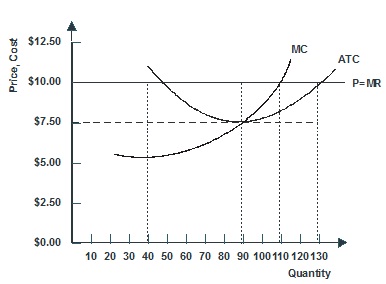Assignment:
1. Data for the market for graham crackers is shown below. Calculate the elasticity of demand between the following prices.
|
Price of crackers
|
Quantity Demanded (per month)
|
|
$3
|
80
|
|
$2.5
|
120
|
|
$2
|
160
|
|
$1.5
|
200
|
|
$1
|
240
|
$1.00-$1.50:
$1.50-$2.00:
$2.00-$2.50:
$2.50-$3.00:
Now, assume the price of graham crackers is $2.75. Should firms raise or lower their prices if they want to increase revenue? Explain this in terms of elasticity.
2. Assume the competitive market shown below faces a short run price of $10. Using the graph below, identify the following:
Profit-maximizing output:
In the long run, the price falls to $7.50. Why does this happen?
What is the new profit-maximizing output?

3. A local hardware store is trying to decide whether to stay open. They have found that their industry is extremely competitive and profits have shrunk considerably. Knowing that you have taken an economics course, the owners have asked for your opinion. Draw 2 completely labeled graphs to help you explain the shutdown decision. One graph must be for the market as a whole, and the other must be for this store in particular. Assume that the store is losing money; however, explain why they may want to stay open for a little while longer. (Note: Your answer must include a written explanation of your graph.)
4. Use the production function below to answer the following questions:
|
Units of Labor
|
Total Output
|
MP
|
|
0
|
0
|
|
|
1
|
5
|
|
|
2
|
15
|
|
|
3
|
30
|
|
|
4
|
42
|
|
|
5
|
52
|
|
|
6
|
60
|
|
|
7
|
65
|
|
|
8
|
67
|
|
|
9
|
63
|
|
|
10
|
55
|
|
a.) Calculate marginal productivity (MP) and put this in the table.
b.) At what level of employment does diminishing marginal productivity begin?
c.) At what level of employment does marginal productivity become negative?
d.) Why does marginal product become negative?